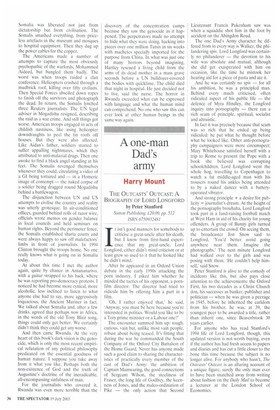The horror!
The horror!
Matthew Leeming
THE ZANZIBAR CHEST. A MEMOIR OF LOVE AND WAR by Aidan Hartley HarperCollins, £20.00. pp. 449 ISBN 0002570599 Ihave to declare an interest. In the late 1980s. I travelled with the author of this book. After university we went to run the bulls in Pamplona together, while our neighing contemporaries were being strapped into their first pinstriped suits. Then we went to Africa, where his family had lived since the 1930s. That Grand Tour was the beginning of the rape of ideology by reality for both of us, a lurch to the right, an end to half-baked student leftyism. Then our paths diverged and I have not seen him for many years. But Aidan Hartley's subsequent odyssey is much more frightening. He has continued to use his experiences to question theory but has seen, in Somalia, humanity in Hobbes's state of nature and, in Rwanda, the utter evil of our species. But my old travelling companion has produced a masterpiece. This is a hugely ambitious book, a history of his family's involvement with Africa over 70 years and can be compared in quality to an equally riveting book by a white African, Rian Malan's My Traitor's Heart. In the end though, it is a tragedy. Nothing good has come out of his family's or Europe's involvement in Africa, either in colonial times or since independence. The 1989
hopes that the post-Soviet New World Order would usher in a new era in Africa have drowned in a tide of blood.
The book tells two stories simultaneously. One is the story of his father and his closest friend, Peter Davey, both colonial officers in Africa and Arabia. The second is the story of his own psychological harrowing by the reality of Africa, which questions what future there can be for the continent. There is little in either story that gives grounds for hope.
The author's father landed in Mombasa in 1928 when the Colonial Office sent him to Lake Victoria to establish a cotton research institute. The local tribe welcomes him and a princess bestows herself on him. He shoots two impala rams standing on an anthill, an action already prophesied by the tribes' wizards as the signal of catastrophic change. From then on he suffered terrible recurrent nightmares and came to believe that he had been possessed. And modernity has brought this village nothing of any good — just diamonds, wars, missionaries, Aids and — as a final indignity — aid workers. At the end of his life he would say, 'We should never have come here.'
'How do I live in this strange place?' asked Rian Malan. In the end, neither generation belongs. In a fine comic passage, Aldan seeks to ingratiate himself with his African brothers by chanting with them 'One settler, one bullet.'
The enlightened colonialism of the British between the wars aimed to exploit Africa's prodigious fertility and integrate it into the world economy by growing commodities. This still seems the continent's best hope. That generation of colonial servants believed they were working to create a better future for the people in their territories, building dams, drilling boreholes and introducing modern farming practices. To win the trust of the people they had to be able to speak to them in their own language. Davey was born in Yemen and spoke Arabic like a Bedu. Yet in 1948 he was murdered by a sheikh he had regarded as a friend. Although Hartley's father wrote conventionally to Davey's parents 'He gave his life for an ideal', in the privacy of his journal he recorded, 'How tragic, how foolish, how wasteful this whole business is. Nothing of any good has come out of any of this' Hartley's own story is just as gripping and moving. With Reuters he sees close up the chaos that foreign intervention in Africa brings. His description of Somalia's descent into barbarism has alarming parallels with Iraq.
When the Americans stormed ashore in Mogadishu in 1993 the Somalis greeted them with garlands of bougainvillea. It seemed to all the journalists that the goodwill and overwhelming might of the superpower would make short work of the problems of Somalia. But they were wrong. Somalia was liberated not just from dictatorship but from civilisation. The Somalis smashed everything, from priceless artefacts in the museum and mosques to hospital equipment. Then they dug up the power cables for the copper. The Americans made a number of attempts to capture the most obviously psychopathic of the warlords, Mohammed Aideed, but bungled them badly. The worst was when troops raided a clan conference. Helicopters crashed through a mudbrick roof, killing over fifty civilians. Then Special Forces abseiled down ropes to finish off the survivors and photograph the dead. In return, the Somalis lynched three Reuters journalists. The UN legal adviser in Mogadishu resigned, describing the raid as a war crime. And still things got worse. American troops engaged in acts of childish nastiness, like using helicopter downdraughts to peel the tin roofs off houses. But they were also affected. Like Aidan's father, soldiers started to suffer appalling nightmares, which they attributed to anti-malarial drugs. Then one awoke to find a black angel standing at his feet. The Somalis revenged themselves whenever they could, circulating a video of a GI being tortured and — in a Homeric image of contempt — the naked corpse of a soldier being dragged round Mogadishu behind a battlewagon.
The disjunction between UN and US attempts to civilise the country and reality was utterly grotesque. In air-conditioned offices, guarded behind rolls of razor wire, officials wrote memos on gender balance in local councils and held seminars on human rights. Beyond the perimeter fence. the Somalis established sharia courts and were always happy to saw off malefactors' limbs in front of journalists. In 1994 Clinton brought the troops home. No one really knows what is going on in Somalia today.
At about this time I met the author again, quite by chance in Antananarivo, with a guitar strapped to his back, where he was reporting pro-democracy protests. I noticed he had become more cynical, more alcoholic, less inclined to listen to what anyone else had to say, more aggressively loquacious, the Ancient Mariner in fact. We talked about Somalia and, after a few drinks, agreed that perhaps now in Africa, in the words of the old Tony Blair song, things could only get better. We certainly didn't think they could get any worse. And then came Rwanda. At the very heart of this book's dark vision is the genocide, which is only the most recent empirical refutation of any political philosophy predicated on the essential goodness of human nature. I suppose you take away from it what you like. Perhaps both the non-existence of God and the truth of Augustine's doctrine of the ineradicable, all-encompassing sinfulness of man.
For the journalists who covered it, Rwanda was even more terrible than the
discovery of the concentration camps because they saw the genocide as it happened. The perpetrators made no attempt to hide what they were doing, hacking into pieces over one million Tutsis in six weeks with machetes specially imported for the purpose from China. In what was just one of many horrors beyond imagining, Hartley rescued a living child from the arms of its dead mother in a mass grave seconds before a UN bulldozer-covered the bodies with quicklime. The child died that night in hospital. He just decided not to live, said the nurse. The horror in Rwanda exceeded what can be expressed with language and what the human mind can comprehend. No one who saw this can ever look at other human beings in the same way again.



























































 Previous page
Previous page